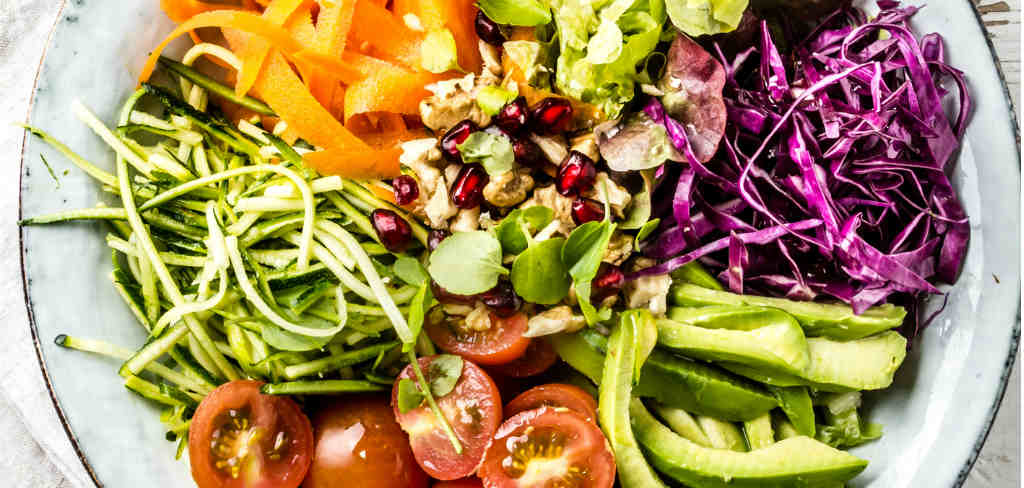
Cancer Prevention Nutrition
It’s well established that a healthy diet is an important element in reducing risk of cancer and other diseases. But with so many different lifestyle choices and fad diets out there, it can be a bit confusing, to say the least.
Is it best to go vegetarian, paleo or full-on vegan? How important is it to pay extra for grass-fed beef or organic produce? And what about stocking up on ‘superfoods’ like kale?
According to experts, the answer is simple: Choose all the above. A meat-free lifestyle is fine but not really necessary, as long as you find a healthy, nutritious balance that can be maintained long-term, said Colleen Doyle, American Cancer Society Managing Director for Nutrition and Physical Activity.
“As far as the more trendy diets, I love the emphasis on eating whole foods, less processed foods, cutting back on sugar,” she said. “But I’m not convinced that legumes, whole grains, and all dairy need to be eliminated! I think Michael Pollan said it best: Eat food. Not too much. Mostly plants.”
Particularly for cancer, the emphasis should be on a healthy dietary pattern. There’s no evidence that a single food group can reduce risk, Doyle said.
“However, having said that, I’m a big believer in including what typically gets defined as superfoods in your diet. Colorful fruits and vegetables, lean proteins and healthy fats — salmon, nuts and olive oil, are all excellent choices.”
Finding the right personal diet plan is “kinda like physical activity — you need to find something you like to do that you can keep doing,” she added. “People should think about a healthy eating pattern, not necessarily a specific diet that could be too limiting and one that you can’t stick with for long.”
Finding that sweet spot
In short, no need to deprive yourself. Just find simple ways to streamline your diet to make it healthy but satisfying. For instance, it’s especially important to limit consumption of processed meat. People who eat items like bacon, hot dogs and deli meat every day have a higher risk of cancer, so ACS guidelines recommend substituting with fish or chicken, maybe tofu.
Consider going vegetarian maybe once or twice a week. Simple steps like that can make a big difference.
“A basic rule is to include more colorful fruits and vegetables,” Doyle said. “In general, the more color, the more antioxidants, phytochemicals and whole grains it has. Cutting back on red and processed meats is important, as well. These are associated with increased risk of colon cancer. It’s also a good idea to cut back on sugar-sweetened beverages. Empty calories are associated with excess weight.”
Keep in mind that excess weight increases the risk of 13 different cancers, including some of the most common, breast and colorectal included, Doyle said. So definitely compliment a healthy diet with an effective exercise program, even if it’s just long walks throughout the week.
“Studies that currently exist suggest that losing weight may reduce the risk, and not only for cancer but also heart disease, diabetes, hypertension, osteoarthritis and more.”
So does it pay to spend extra on organic produce and grass-fed meat? It’s an attractive option that’s reassuring to many, but there’s no real evidence that they’re safer or more effective at preventing cancer, Doyle said. The same holds true for non-genetically modified food.
But, as the American Cancer Society points out, lack of proof of harm isn’t the same as proof of safety. And going organic or non-GMO certainly can’t hurt, Doyle said.
“First, I think it can be important to check food labels if you know what to look for,” she said. “Just understand that a lot of what’s on labels is about marketing, and not health.”
Cancer-free kitchen
A good first step in launching a healthy and nutritious diet plan is to stock your kitchen with healthy foods, particularly things that you can throw together for quick healthy meals to avoid eating out frequently, Doyle said.
“Eating out is associated with weight gain, and meals we eat out tend to be higher in calories, fat and sodium, and less healthy in terms of nutrients than meals we make at home.”
While you’re at it, might as well get rid of water bottles, plastic containers and canned foods with bisphenol A — that’s BPA, the industrial chemical that’s been used to make certain plastics and resins since the 1960s.
A number of companies have stopped using BPA, particularly among products targeting infants and young kids, and a number of states have passed legislation restricting or banning sales of products containing BPA.
“Concerns have been raised about potential negative impact on health from items containing BPA,” Doyle said. “But when you look at all of the research currently out there, none of these potential impacts have been clearly linked to health risks, including cancer. But I do encourage people who are concerned to limit exposure. Basically, use glass containers for storing foods.”
The bottom line: You can do all the right things and still get cancer, of course, but there are ways to be proactive in maintaining a considerably healthier lifestyle, Doyle said.
“Many people feel like there is nothing they can do to reduce their cancer risk, but in reality, there are easy, practical steps people can take each day.”